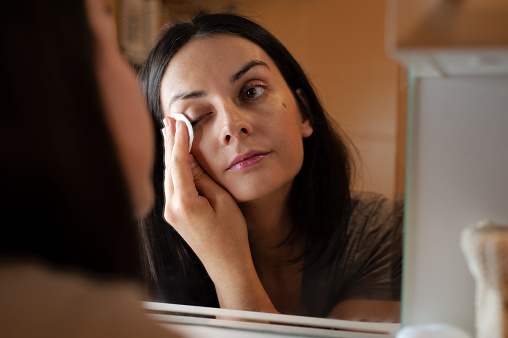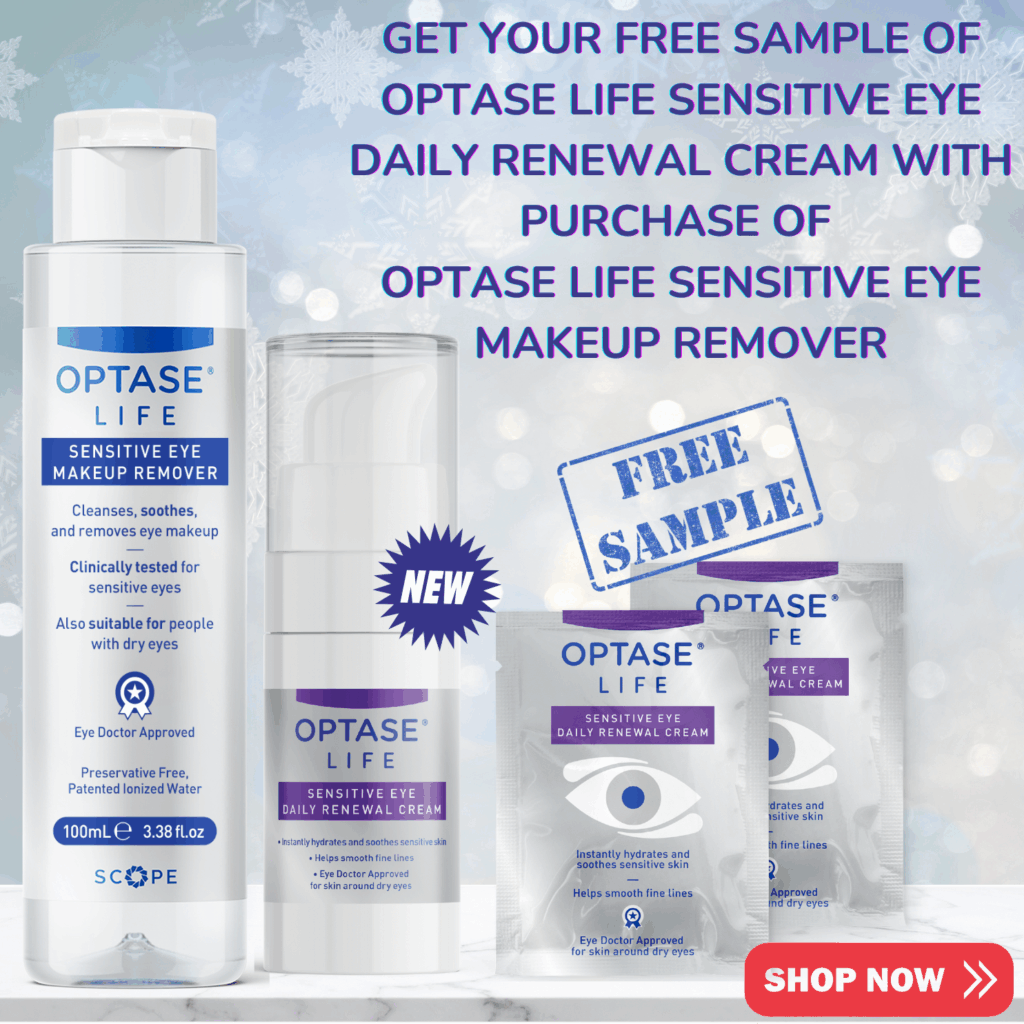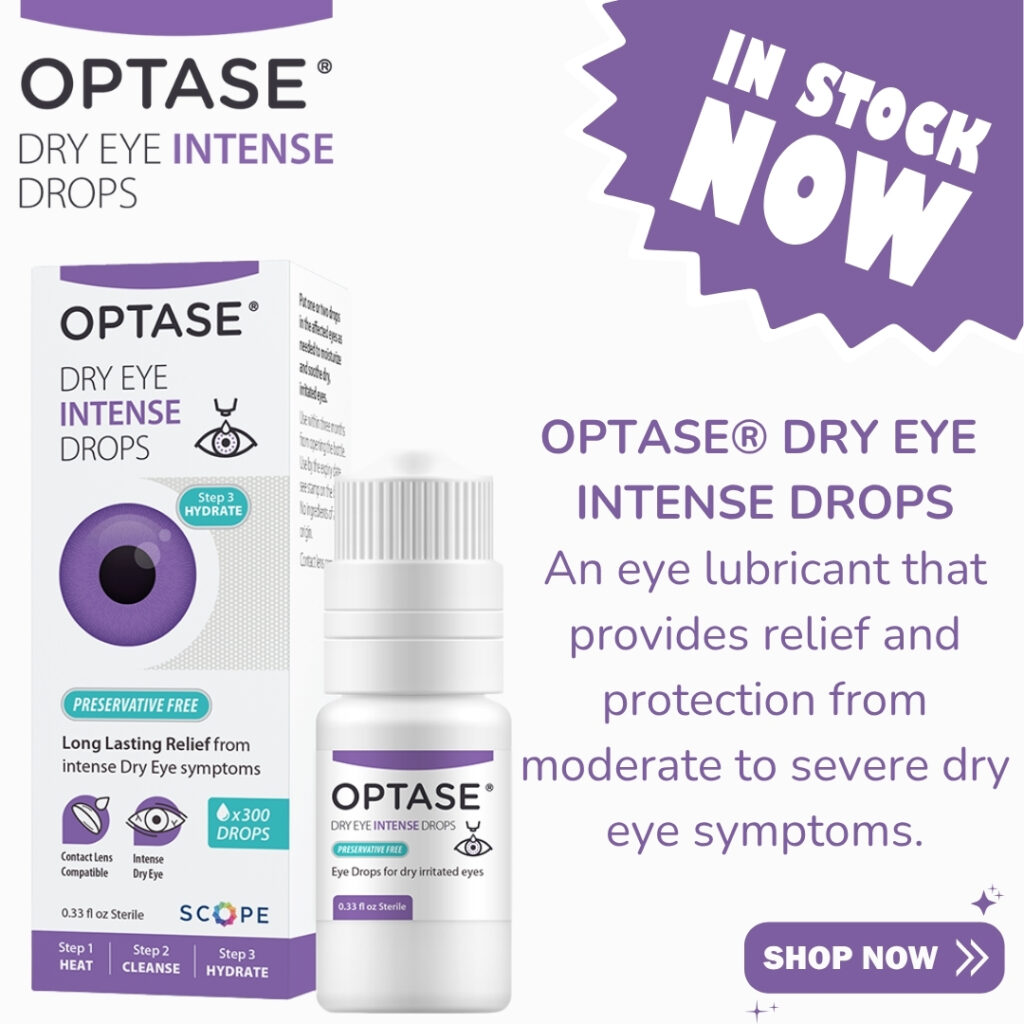The Hidden Link Between Makeup and Dry Eyes
For many of us, eye makeup is part of our daily confidence routine but if you live with dry or sensitive eyes, that beauty boost could come at a cost. More and more research is revealing that what we put around our eyes can directly influence how well our dry eye treatments work.
Why Eye Makeup Can Be Problematic
The eyes are delicate, finely balanced systems. Even small disruptions to the tear film – that’s the thin protective layer that coats the eye’s surface – can cause discomfort or dryness. Certain ingredients and pigments from eye makeup can make their way into this tear film and that’s when you start to feel the irritation. This is why it is so important to seek out safe cosmetics for dry eye.
According to the TFOS Lifestyle Report (Tear Film & Ocular Surface Society), cosmetic products can contribute to tear film contamination and dysfunction, while optometry sources have linked makeup migration to inflammation and meibomian gland blockage. These glands, located along the eyelids, produce the oils that prevent tears from evaporating too quickly so when they’re blocked, your eyes can feel dry and gritty.
Halloween: The Worst Week of the Year for Eye Irritation?
If there’s one time of year when your eyes deserve a little extra care, it’s Halloween. From costume makeup and false lashes to face paint and glitter, these festive touches can transform your look for the night – but they can also be a perfect storm for irritation and injury if you’re not careful.
The big problem is that many Halloween makeup and accessory products are not ophthalmically tested, meaning they haven’t been designed or approved for safe use near your eyes. The adhesives used for lashes, gems or prosthetics can trigger allergic reactions or inflammation, while loose glitter and pigments can easily get into your eye, scratching its surface and causing redness and pain.
It’s worth remembering that what looks stunning under party lights or on your Instagram feed can leave your eyes sore, red, or even infected by morning. Always choose high-quality, eye-safe products, remove all makeup carefully before bed and give your eyes a chance to recover after the festivities. A little caution now can help keep your vision clear long after the spooky season ends.
Makeup Mistakes That May Be Sabotaging Your Dry Eye Treatment
Even when you use high-quality products, certain makeup habits can undo your best efforts to manage dry eyes.
Using Harsh or Waterproof Removers
Many makeup removers contain surfactants, preservatives or alcohol that can strip away the natural lipids protecting your eyes. This weakens the tear film and makes the ocular surface more vulnerable. Waterproof mascaras and eyeliners are particularly difficult to remove, leading many people to over-rub or reach for harsher products – both of which can worsen dryness and irritation.
Applying Makeup Too Close to the Waterline
Also known as tightlining, applying eyeliner directly to the waterline is a beauty trend that’s here to stay – but for anyone managing dry eye, it’s a risky one. Lining this sensitive area directly exposes the tear film to pigments and waxes, disrupting its stability.
Studies show that tightlining can increase contamination of the tear film and obstruct meibomian glands, leading to inflammation and poorer tear quality.
Reusing Old or Contaminated Brushes & Products
Your makeup bag might look clean, but bacteria thrive in moist, dark environments and affect everything including mascara tubes, eyeliner pencils and applicators. Old or unwashed brushes can introduce bacteria to your eyes too, increasing the risk of infection and inflammation.
So, this Halloween, resist the urge to swap lashes or borrow your friend’s glitter palette – because sharing makeup can lead to something scarier than any costume like conjunctivitis which is not the kind of red-eye you want in your selfies.
Sleeping in Makeup
We’ve all been there – you come home late, your costume makeup still flawless and you promise yourself you’ll take it off ‘in the morning’. Unfortunately, sleeping in makeup is one of the worst things you can do for your eyes.
Left overnight, makeup particles can flake off into the eyes, blocking glands, increasing inflammation and reducing tear quality. After heavy Halloween looks in particular, always take the extra few minutes to remove everything before bed. Your eyes will thank you.
Safe Alternatives for Dry and Sensitive Eyes
The good news? You don’t have to give up eye makeup altogether. With the right choices and techniques, you can enjoy wearing makeup while still protecting your eyes.
Go Fragrance-Free and Preservative-Free Makeup and Removers
Fragrance and preservatives are two of the most common triggers for eye irritation. They’re added to enhance scent or prolong shelf life, but both can disrupt the delicate skin barrier and inflame the eyelid margins.
Opting for clean-label, preservative-free products helps reduce the risk of irritation. The OPTASE LIFE range is developed with this in mind, using minimal, gentle ingredients that protect both the eyes and surrounding skin.
Look for Dermatologist-Tested, Ophthalmologist-Approved
When shopping for eye makeup or removers, look for products that are explicitly labeled ‘ophthalmologist-tested’ or ‘safe for sensitive eyes’. These formulations are designed to reduce the likelihood of ingredient migration and tear film disruption.
Dermatologist-tested options also ensure that products won’t cause reactions around the delicate eye contour – essential for those managing both skin and eye sensitivity.
Apply Wisely – Tips for Safer Application
A few small tweaks can make a big difference when you’re getting party-ready:
- Steer clear of the lash line. Try applying liner just above your lashes rather than directly on the waterline – it looks just as good and keeps things safer for your eyes.
- Keep brushes clean. A quick weekly wash with a gentle, fragrance-free cleanser helps avoid a buildup of bacteria and keeps your makeup looking fresh.
- Go for single-use lashes. If you’re a fan of falsies, it’s best to use a new pair each time.
- Take it off (sooner rather than later). The earlier you remove your makeup, the less time potential irritants have to linger.
The Importance of Proper Eye Makeup Removal
Cleansing the eye area correctly is just as important as what you put on. Harsh removers can undo hours of dry eye treatment progress in seconds.
Don’t Just Use Any Remover – Here’s Why
Generic or oil-heavy removers often contain surfactants, preservatives and alcohol that strip the lipid layer of your tears. Others leave residue that interferes with drops or treatments. Over time, this can worsen dryness and make your eyes more reactive to environmental triggers.
Meet OPTASE LIFE Sensitive Eye Makeup Remover
If you’re managing dry eye, you need a specific eye makeup remover for sensitive eyes, one that’s effective yet gentle and that clears makeup without compromising your eye health.
OPTASE LIFE Sensitive Eye Makeup Remover is formulated with just seven clean ingredients and patented ionized water technology to lift away makeup while protecting the skin barrier.
It’s free from preservatives, fragrance and colorants, making it gentle enough even for sensitive eyes. Clinically tested for those prone to dryness or irritation, it helps support the skin’s natural barrier while reducing moisture loss, keeping the delicate eye area comfortable and hydrated.
And unlike typical removers, it doesn’t strip essential lipids or irritate the ocular surface – making it ideal for daily use.
How to Use It – Step-by-Step Routine
- Apply to a soft cotton pad or reusable round – one per eye to avoid cross-contamination.
- Gently press and hold over the closed eye for a few seconds to allow the remover to break down makeup.
- Wipe gently – never scrub. Move from the inner to outer corner.
- Follow with a warm compress to help clear meibomian glands.
- Finish with preservative-free lubricating drops if needed for extra comfort.
This simple routine keeps your eyes clean, hydrated and ready for a comfortable night’s rest.
Before & After: Halloween Makeup Care for Dry Eye Sufferers
Halloween makeup doesn’t have to mean post-party irritation. A few preventive steps can make all the difference.
Before You Apply:
- Choose ophthalmic-safe products. Check labels for “ophthalmologist-tested” and avoid glitters or adhesives near the eyes.
- Prime with a barrier-safe eye cream. Using OPTASE LIFE Hydrating Eye Cream creates a protective layer that helps minimize pigment migration.
- Wash your hands and brushes thoroughly before use to avoid bacteria transfer.
After the Party:
- Remove all makeup that night – no exceptions.
- Use OPTASE LIFE Sensitive Eye Makeup Remover to gently cleanse without harsh chemicals.
- Follow with a warm compress to open glands and restore moisture balance.
- Finish with preservative-free eye drops to soothe and rehydrate.
FAQs About Eye Makeup and Dry Eyes
Can I wear eye makeup if I have dry eyes?
Yes, but be careful about the products and techniques you use. Choose clean, ophthalmic-safe formulas, avoid tightlining and always remove makeup thoroughly. Pair your routine with supportive dry eye treatments like warm compresses and preservative-free drops.
What makeup ingredients should I avoid?
Look out for fragrance, parabens, formaldehyde releasers, alcohol and heavy waxes. These can irritate the skin and disrupt the tear film. Preservatives such as benzalkonium chloride (BAK) are particularly drying and should be avoided in any product near the eyes.
Can I use micellar water or oil-based removers?
Micellar waters can seem gentle, but many contain surfactants that strip the eye’s protective lipids. Oil-based removers can leave residue that interferes with tear stability. OPTASE LIFE Sensitive Eye Makeup Remover offers a cleaner alternative as it effectively removes makeup while respecting the ocular surface.
How often should I replace eye makeup if I have sensitive eyes?
Every three to six months for mascara and eyeliner and every six to twelve months for eyeshadow. Never share makeup or brushes and discard any product that changes smell or consistency.
Conclusion
Makeup can be a wonderful form of expression, but when you’re managing dry eye, awareness is key. Everyday habits like tightlining, reusing brushes, or sleeping in makeup can quietly sabotage your treatment progress. Seasonal factors, like heavy Halloween looks, can make matters worse.
By switching to clean, ophthalmic-safe products and removing makeup properly every night, you can protect your eyes while still enjoying your favorite looks.
Protect your eyes – even when you glam up.
Discover the OPTASE LIFE Sensitive Eye Makeup Remover clinically proven, clean-label, and designed with your eye health in mind.



